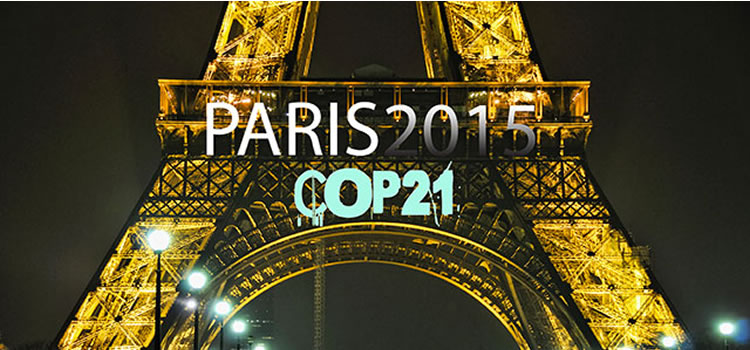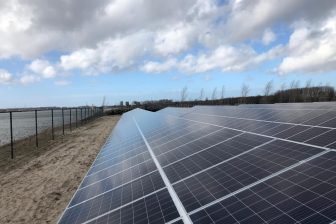‘Klimaatakkoord van Parijs gaat lang niet ver genoeg’

4 november 2016 – De boodschap van het milieuorganisatie van de Verenigde Naties dat de wereld veel en veel meer moet doen om de CO2-uitstoot terug te dringen en een klimaatramp te voorkomen, is donderdag uitvoerig onderbouwd en toegelicht. Een kort overzicht van wat de verschillende media daaruit oppikken. (Wordt geüpdatet.)
‘All is not lost’
‘(…) Less than 24 hours before the Paris Agreement formally enters into force, the United Nations Environment Programme (UNEP) has warned that governments and the private sector must together scale-up climate ambition to reduce an additional 25% from predicted 2030 greenhouse gas (GHG) emissions. The annual UNEP Emissions Gap report finds that 2030 emission levels are set to reach 54-56 gigatonnes of CO2 equivalent (GtCO2e), even if the Paris Agreement is fully implemented and enacted upon, placing the world on track for a temperature rise of 2.9-3.4 degrees this century. (…) The fact that 2015 was the hottest year on record and the first six months of 2016 have continued the record-breaking global warming trend has highlighted the need for urgent action. The UNEP report presents an assessment of the various technologies and opportunities which could help limit emissions to the 42GtCO2e level needed to limit global warming to under 2C this century. (…)’
Edie.net
Only three years to save 1.5 C climate target
‘(…) The door will close on the 1.5C warming limit unless countries raise their ambition before 2020, says the UN Environment Program (UNEP). Greater pre-2020 action is the “last chance” for 1.5C, says the latest annual UNEP Emissions Gap report. (…)’
CarbonBrief
These words are by far the most dramatic
‘(…) In a foreword to this year’s report, Erik Solheim, head of UNEP, and Jacqueline McGlade, UNEP’s chief scientist, write: “We must take urgent action. If we don’t, we will mourn the loss of biodiversity and natural resources. We will regret the economic fallout. Most of all, we will grieve over the avoidable human tragedy; the growing numbers of climate refugees hit by hunger, poverty, illness and conflict will be a constant reminder of our failure to deliver…As the Paris Agreement legally enters into force, we sincerely hope this report will be a wakeup call to the world.” These words are by far the most dramatic to introduce a UNEP emissions gap report. (…)’
CarbonBrief
‘We need to move much faster’
To put the challenge into perspective, UNEP noted that the gap is 12 times the annual emissions of the 28-nation European Union’s transport sector, including aviation. “The science shows that we need to move much faster,” said UNEP leader Erik Solheim. “The growing numbers of climate refugees hit by hunger, poverty, illness and conflict will be a constant reminder of our failure to deliver.”
CTV News
China, Europäische Union und Indien auf einem guten Weg
‘(…) Die 2015 vereinbarten Pariser Klimaziele scheinen derzeit kaum erreichbar zu sein. (…) Um wie vereinbart die Erderwärmung bis Ende des Jahrhunderts auf maximal zwei Grad zu begrenzen, müsste der für 2030 erwartete Ausstoß von Treibhausgasen um rund ein Viertel verringert werden, heißt es im Emissions Gap Report 2016. (…) Über 190 Staaten hatten sich beim Pariser Klimagipfel im Dezember 2015 dazu verpflichtet, die globale Erwärmung auf “deutlich unter zwei Grad” – oder besser noch auf 1,5 Grad – zu begrenzen. Die Weltklimakonferenz, bei der es darum gehen wird, wie das erreicht werden kann, beginnt am Montag in Marrakesch. Laut des Emissions Gap Report sind China, die Europäische Union und Indien auf einem guten Weg, ihre Versprechungen von früheren Konferenzen bis 2020 einzuhalten. Die USA, Kanada und Mexiko dagegen müssten ihre Anstrengungen erhöhen. (…)’
Die Zeit
“Vermeidbare menschliche Tragödien”
Die Zeit
Paris Deal Won’t Be ‘Enough’ To Stave Off Worst Effects Of Climate Change
‘(…) To have any chance of staving off the worst effects of climate change, the world must “urgently and dramatically increase its ambition” to cut emissions, the U.N. Environment Program said. (…) Most of the vows in the Paris deal are voluntary and there are no repercussions for countries that fail to adhere to promised cuts. And even if all Paris pledges are fully implemented, predicted emissions in 2030 will still place the world on track for a temperature rise of 2.9 to 3.4 degrees this century. (…)’
Huffington Post
The world is racing to stop climate change. But the math still doesn’t add up
‘(…) The entire globe is moving fast to stop climate change. The Paris climate agreement enters into legal force on Friday, and then shortly afterwards comes a first global meeting to start implementing it in Marrakech, Morocco. (Yes, there’s also a U.S. election in there somewhere that could, er, complicate things.) But this flurry of activity nonetheless faces a grim mathematical reality, a new report from the United Nations Environment Programme finds. In essence, while the Paris agreement sets extremely ambitious temperature goals — holding the world’s warming to “well below” 2 degrees Celsius above pre-industrial levels, and striving for a 1.5 degree limit — current policies and promises alone have little chance of attaining them. Moreover, because of the unforgiving nature of carbon math — once you emit a ton of carbon dioxide, you can’t get it back, and it accumulates steadily in the atmosphere — there is exceedingly little time to change course and increase ambitions. (…)’
The Washington Post
One gigaton is the equivalent of taking all European vehicles off the road for one year
‘(…) “When you think that one gigaton is the equivalent of taking all European vehicles off the road for one year, and the gap is between 12 and 14 gigatons, you see what the scale of the problem is,” explains McGlade [UNEP’s chief scientist]. (…) Granted, McGlade underscores that this doesn’t mean there is no hope — it just means that the world has to do massively more, and it has to do it quickly. Every year, we bank more carbon emissions in the atmosphere. Every year we fail to bend the curve sharply downwards, it becomes that much harder to get on the right course. (…)’
The Washington Post
Eerder in actie
‘(…) ”We gaan in de goede richting’’, zei directeur van het Milieubureau Erik Solheim. ”De overeenkomst van Parijs zal de klimaatveranderingen vertragen, maar het is niet genoeg om die te stoppen.” Solheim riep eerder op tot actie over te gaan. Om te beginnen op de Wereld Klimaat Conferentie die maandag begint in de Marokkaanse stad Marrakesh. (…)’
Nu.nl
Klimaatvluchtelingen
‘(…) “Als we niet snel bijkomende actie nemen, te beginnen met de klimaattop in Marrakesh, zullen we rouwen over een ramp die te vermijden was”, zegt Solheim. “Het groeiende aantal klimaatvluchtelingen die getroffen zijn door honger, armoede, ziekte en conflict zal een constante herinnering zijn aan ons falen als we niets doen. De wetenschap toont dat we veel sneller actie moeten ondernemen.” (…)’
De Morgen



